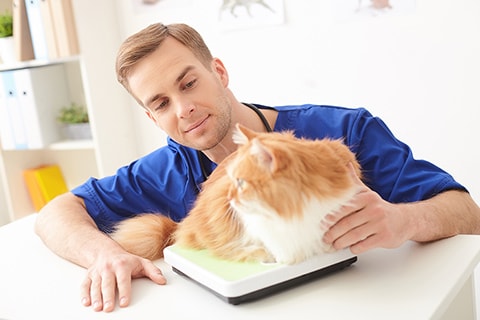Every pet deserves the best quality individualized veterinary care available. At Green Valley Animal Hospital, we want to keep your pet family healthy. Bi-annual wellness examinations help us to understand your pet’s health trends. This helps us to compile a thorough history, including up-to-date blood test results, thus giving us a baseline to measure any changes in your pet’s health.
During each exam, our doctors will perform a hands-on nose to tail check. During this time the doctors and staff will discuss some of the following with you:
- Check Weight
- Diet
- Behavior issues or changes
- Nutrition
- Check mouth for brief dental exam
- Vaccines and boosters
- Examine ears, eyes
- Listen to heart and lungs
- Check skin
- Parasite screening and prevention
A Junior Wellness Panel is advised for regular health monitoring of all pets less than 6 years of age. Junior Wellness testing allows our doctors to detect problems before becoming a major concern or greater threat to your pet’s health. Junior Wellness also establishes baselines that are important in monitoring your pet’s health trends. Junior Wellness work-up includes:
Dogs & Cats: Kidney and liver values, blood protein levels, red blood cell, white blood cell and platelet levels.
Outdoor cats: In addition to the above, cats that visit outdoors are advised to have a Feline leukemia (FeLV) and Feline Immunodeficiency Virus (FIV) test performed every 6-12 months (as needed).
Senior Wellness Panels should be performed annually on all pets over 7 years of age for routine monitoring, unless a problem should arise. Testing for dogs and cats includes: kidney and liver values, pancreas, electrolytes, protein levels, thyroid, blood pressure and urine. Senior comprehensive exams include the above-mentioned blood tests plus thoracic and abdominal radiographs to check for possible organ enlargement or tumors.
Did you know that obesity is a true disease process which can lead to complications that jeopardize your pet’s health? Conditions such as diabetes mellitus, osteoarthritis, cardiac disease, and respiratory disease all develop more readily in obese pets. During each veterinary exam, your pet’s body condition score is evaluated. If your pet is found to be overweight or obese, diagnostic testing may be advised to rule out underlying problems. Personalized weight management programs may include special therapeutic diets and an exercise plan. Weekly to monthly clinic weigh-ins are important to check your pet’s progress and stay on track.
While we know pets age faster than people, we want to make sure your pet lives a healthy and long life. Senior wellness/Geriatric work-up includes:
Dogs: CBC (complete blood count): Checks for signs of anemia, infection, inflammation, certain cancers.
Chemistry: Values show signs of liver & kidney disease, blood proteins associated with intestinal disease and certain cancers, check blood electrolyte levels.
Thyroid: Thyroid levels control metabolism, hair growth, weight loss or gain, neurologic function and skin conditions.
Cats: FeLV/FIV: Retroviral infection can cause serious disease in cats that can be spread through blood (FIV), or through casual contact such as grooming, sharing food or water dishes.
